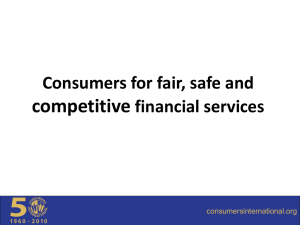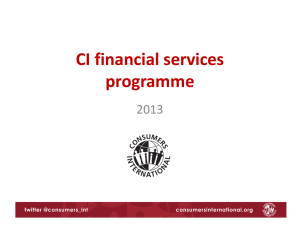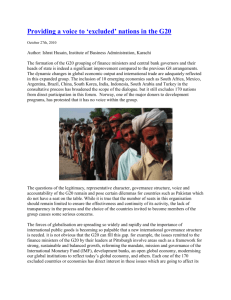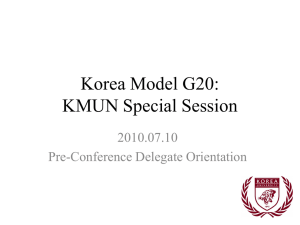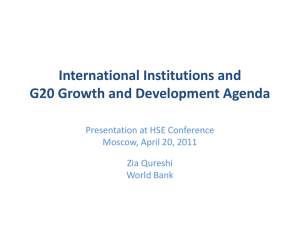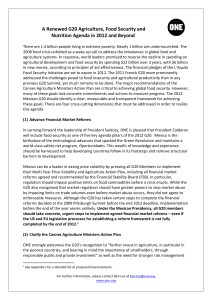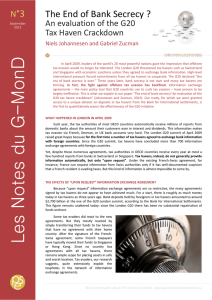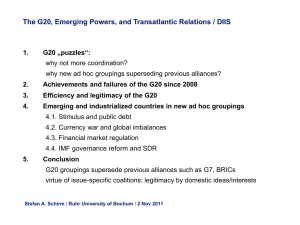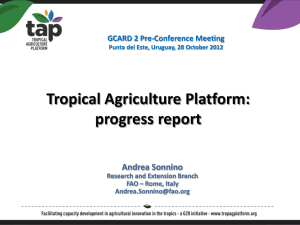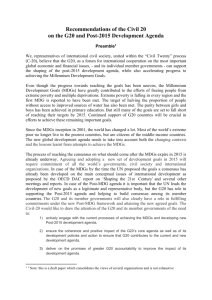B20 Task Forces Preliminary Recommendations. Presentation to
advertisement
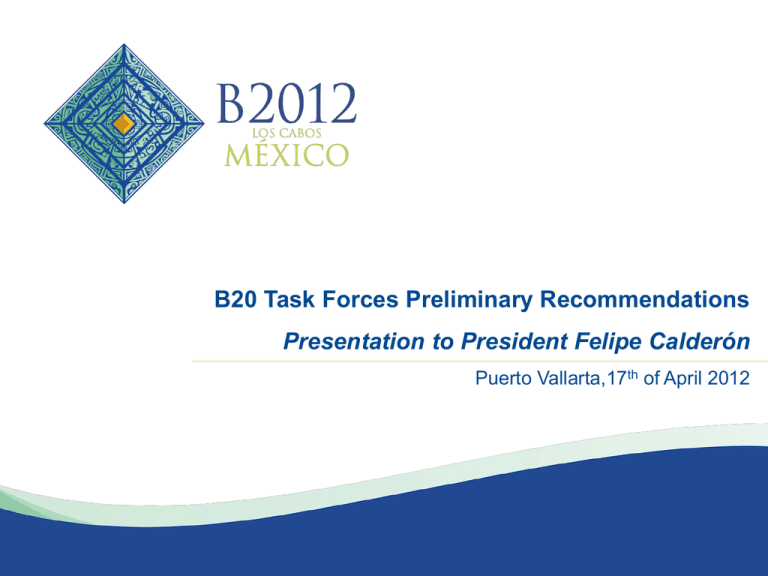
B20 Task Forces Preliminary Recommendations Presentation to President Felipe Calderón Puerto Vallarta,17th of April 2012 MARZO 2012 Food Security The G20 should… 1 Significantly enhance public and private-sector investment to achieve a 50% increase in agricultural production and productivity by 2030. Governments can attract greater private-sector investment through policy measures, infrastructure and risk management. 2 Improve risk management and access to finance to enable investment. Launch a public-private initiative to activate risk management solutions. 3 Strengthen and enforce land rights through adequate legal frameworks and enforcement. 4 Improve market information, including implementation of the AMIS initiative and promotion of internet- and telecom-based platforms in rural areas. 5 Increase investment in research and development, as well as technology transfer, training and capacity-building. Food Security The G20 should… 6 Scale up sustainable farming practices including water-efficient, climate-smart and high productivity agriculture. 7 Develop full life cycle assessments to estimate and minimize environmental and food security impacts of biofuel policies. 8 Expand availability, distribution and access to appropriate nutritious products and services in partnership with all stakeholders. 9 Strengthen national-level food security programmes, supported by public private partnerships. Green Growth 1 The G20 should promote free trade in sustainable goods and services, and support the delivery of Sustainable Energy Trade Agreements. 2 The G20 should aim to deliver robust carbon pricing by ensuring that national approaches create consistent international demand, supporting new market mechanisms, linking national and sector approaches and introducing an international framework that includes aviation and shipping. 3 The G20 should commit to end subsidies and other inefficient forms of support for fossil-fuel exploration, production, and consumption in the next 4 years. 4 The G20 should increase direct support for research, development, demonstration, and pre-commercial deployment of low-carbon and energy efficient technologies, using revenue from carbon pricing and other measures. 5 To address risk and improve profitability, G20 finance ministers and development finance institutions should strategically target their funds to leverage private investment in green infrastructure at scale. Employment 1 Commit to strategic infrastructure investments. 2 Implement structural labour market reforms and policies. 3 Facilitate the growth of SMEs and innovative business models. 4 Improve collaboration between business and educational institutions. 5 Scale internships and apprenticeships. Improving Transparency and Anti-Corruption 1 Overall, the G20 should reaffirm the mandate of the G20 Anti-Corruption Working Group beyond Los Cabos, and maintain a strong and continuous dialogue with the business community. G20 and B20 should work to: 2 Ensure transparency in Government procurement. 3 Promote, extend and implement sector based initiatives. 4 Ensure private sector participation in peer reviews required by the UNCAC and continue the consultation with the OECD Working Group on Bribery in the context of its monitoring mechanism. 5 Create business programs, including training, to encourage cross-fertilization program best practices within the private sector and between the public and private sectors. 6 Encourage the adoption of business codes of conduct with a specific focus on SMEs. 7 Strengthen the legal and regulatory framework on anti-corruption. Trade and Investment 1 The G20 should make trade and investment a permanent item on its agenda. 2 The G20 should lead by example in rejecting measures that restrict trade and investment and in promoting measures that enhance trade and investment. 3 The G20 should encourage progress in multilateral trade liberalization and rule-making within the WTO. 4 The G20 should support progress on specific items on the WTO negotiating agenda on a priority basis. 5 The G20 should reiterate its support for open cross-border investment as an essential contributor to growth, development and job creation. 6 The G20 should create a working group on investment to advance this agenda and report back to the next G20 Summit in Russia in 2013. ICT & Innovation 1 Enabling Broadband for All – The G20 should promote the availability of affordable broadband services and devices to allow all the population to connect, taking into consideration the starting point for each country. 2 Promoting Social Inclusion through ICT – The G20 should promote the creation of content and applications for the public good, and foster the development of the required capabilities for their deployment. 3 Ensuring Cyber-security for All – The G20 should encourage the creation of regulation and processes that promote solutions to enable cyber-security, in a changing threat environment. 4 Promoting Innovation in ICT – The G20 should encourage the creation of the appropriate environment that allows innovation through education and the development of incentives that promote investment, protecting the intellectual property of the creators. Financing for Growth and Development 1 The G20 should create an environment that leads to a rapid expansion in access to finance through improved regulation, broader distribution channels, product and IT innovation and which balances barriers to entry and incentives to provide finance. 2 The G20 should support national and international efforts that promote financial education, consumer protection, development of universal credit information bureaux and financial inclusion for individuals and SMEs, particularly addressing over-indebtedness and an improved legal framework to protect property rights and foreclose collateral. 3 The G20 should support efforts by all countries to increase SME finance through better credit risk, provision, access, guarantee programs and a unified national agency that promotes this segment. 4 The G20 should recognize the low risk nature of trade finance activity and its value to emerging economies by focusing the FSB, IMF, and World Bank study on the unintended consequences of the capital and liquidity treatment of trade finance. 5 The G20 should commission a study that will consider ways to encourage the adoption of trade finance in currencies other than the US dollar. Advocacy and Impact Phase I: Support generating recommendations 1 Starting point: Tracking of past B20 recommendation. 2 B20 on G20 agenda: Collaboration with other task forces. Phase II: Help coordinating advancement efforts 1 Interaction and advancement of recommendations. 2 Follow-up mechanism for recommendations of B20. Illustrative example of B20 template Not available Some progress No progress Full advance / no longer a priority ARG TUR S. AR S. AF INDO US IND CHI BRA KOR RUS MEX JPN CAN UK ITA GER FRA EU AUS ILLUSTRATIVE Recommendation Financing 1. Fiscal consolidation 2. Credit availability 3. Sound compensation Adv. Corr Green Growth Trade & Investment 4. Assistance 5. Exchange rates 6. Socioeconomic (infrastructure) 7. Trade 8. Fossil fuels 9. Clean energy 10. Corruption 12. International cooperation • The final dashboard will: – Consider all B20 recommendations – Consider all information sources available – Circulate to countries to get their input on the advancement of recommendations 11 B20 Task Forces Preliminary Recommendations Presentation to President Felipe Calderón Puerto Vallarta,17th of April 2012 MARZO 2012
